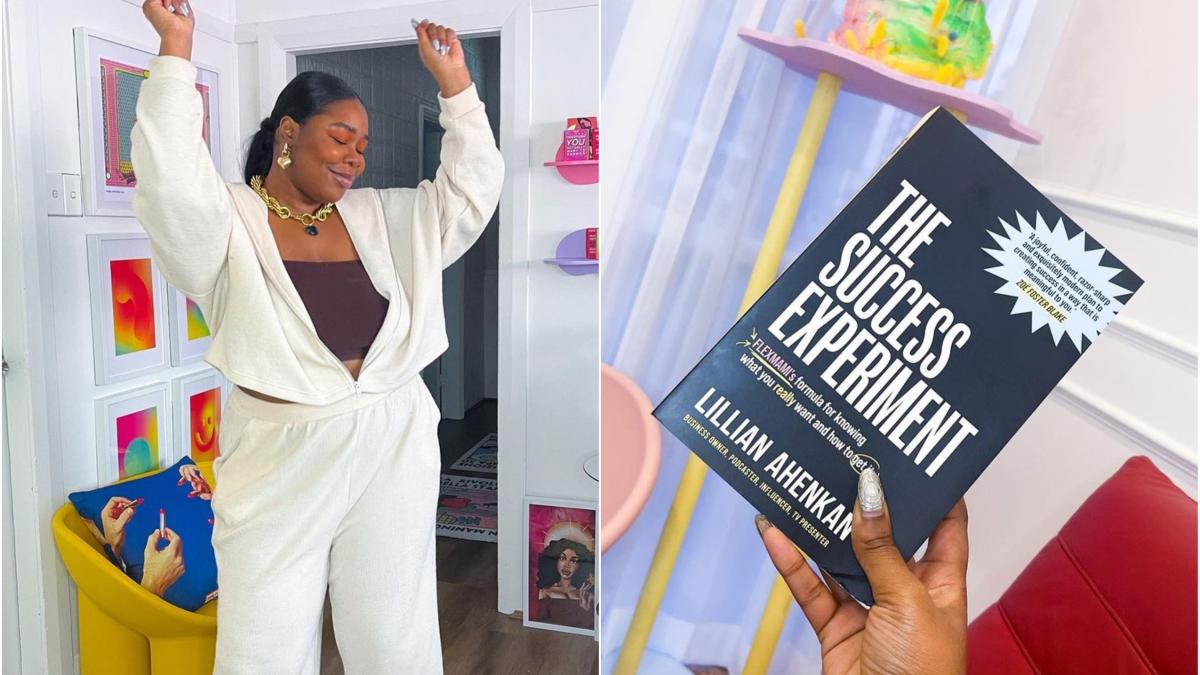
Lillian Ahenkan – AKA Flex Mami – just released her book for FREE (!!!) on Audible. That’s it, that’s the introduction.
The Success Experiment originally came out earlier this year, but Ahenkan has now teamed up with Audible to fill your earholes with her guidance on everything from unlearning the traditional notions of success to critical thinking. It’s a process, baby! And we’re here to learn.
PEDESTRIAN.TV chatted to Ahenkan about her debut book, from how she found the writing process to her definition of success.
This interview has been edited and condensed for length and clarity.
PEDESTRIAN.TV: How would you describe your book to a friend?
Lillian Ahenkan: Oh! I would describe my book as an experiment that hypothesises that if you replicate the same tools I use to create my own metric of success, you too can create your own metric of success and make your life feel better.
A formula made by me, for you, for your own pleasure.
PTV: And what was the writing process like for you?
LA: So terrible, so hard [laughs].
PTV: How long did it take you to write?
LA: Almost two years! And that wasn’t like two years of dilly dallying, that was two years of me being late to every submission. I think what just made it difficult was – it’s one thing to take – I said to my publishers that I would only write things that I knew really well.
And I was struggling with the tone, because I didn’t want to be an authority on somebody else’s life. I don’t know what you’re going through, I don’t know what external factors are inhibiting you from doing what you want. And I also don’t know how much control or capacity you feel like you have over your own behaviour, and I didn’t want to prescribe someone information that made them feel insecure or belittle them. So the tone was really difficult for me. And because I’m quite a matter-of-fact speaker, it’s really hard for me to soften my language, without sounding unsure.
Anyway, I figured it out! [laughs] But it was hard! And also I think I was just really naive about what writing would be like. I just felt like it would be – I don’t want to say more collaborative, but my publishers really trusted me.
They trusted that I knew what I wanted to talk about, but I hadn’t written a book before. And I think that my standards for myself were quite high, but I’m entering a whole new industry and it’s very traditional and it’s very conservative. And there are so many different ways I wanted to articulate myself that I knew would contrast with the way people are used to consuming words on a paper.
So it was just a lot of push and pull and I think what made it difficult for me was the fact that I was commodifying myself, everything was so personal. So, that needs to be right, that needs to reflect me as I see me, not me as you see me.
PTV: How would you say your definition of success has changed from when you were, say, 17 to now?
LA: Yep, so my definition of success when I was 17 was definitely informed by the media I was consuming. I think celebrity culture was really, really big then and also, um, traditional milestones, like going to uni, getting a “good job”, being in a “relationship” – these are all traditional success milestones that I really latched on to quite heavily.
I felt like I didn’t understand that I had a say in what those milestones were, so I just went for them anyway. I think I only had a say in how I achieved those success milestones as opposed to what those success milestones are.
Now, in Rihanna‘s 2021, success to me is being able to make sure that my inner reality and my inner delusion, my inner wants, needs, weaknesses align very neatly with how I’m projecting myself and what I prioritise. Often, they’re at a conflict, you know?
I think there’s a conflict for most people – I imagine a lot of millennials and older gen Zs are in this limbo of, ‘I want all these unconventional, exciting things. I want to be creative, I want to live a life that’s more sustainable’ – whatever it might be. But when they measure the quality of their life, they use these really traditional milestones, and I’m kind of like, ‘What does it matter if you don’t own a house, babe? You don’t even want a house. What are you talking about?’ [laughs]
We can laugh about it now, but that thinking becomes so insidious because your conscious mind is like, ‘I’m just taking in what you’re teaching me.’ So, if you’re getting upset or if you’re feeling insecure about not having a house – your subconscious mind is like, ‘House is a priority. Let’s make you feel bad because you don’t have a house.’
So the book is really just about taking accountability for what you can, really. And spending less time lamenting over what you can’t change.
PTV: What I love about your book is that it made me fear failure less, which is something I don’t think we talk about anywhere near enough. Would you agree?
LA: I agree! I think failure is the one thing you can guarantee, like I can understand when people are really insecure about success because for most people it’s just not coming through like you want it to.
Failure, though? I can guarantee. Sis is on her way, she’s staying a while, she’s pulling up a chair. She’s like, ‘Are you thirsty? I’m thirsty’. So I feel as though people love to have this, ‘Out of sight, out of mind’ perspective when it comes to failure.
It’s this whole idea that if you don’t think about failure, it won’t happen to you – it’s not true. It just makes you less resilient, it just makes you less aware and also, you don’t have the tools to, almost, reflect accurately if you’re not aware that failure is clearly coming and there’s something to learn from it.
I’m not saying to put yourself in risky situations just to feel something, but just know it’s coming for you so the least you can do is prepare, or be prepared to prepare.
PTV: Was there anything else you wanted to add that we haven’t talked about yet?
LA: Um, everybody should get the book on Audible ‘cos it’s FREE. There is no reason not to plug it in and honestly, I keep telling people that if you just read the first two chapters and don’t do anything else, I promise you – I feel so certain of those first two chapters, it will benefit you in some way.
The rest of the chapters, require you to do a lot of work that I’m not sure most people have the capacity to do and that’s why it’s an experiment. Because I don’t know what will happen from chapters three to six, but the first two I guarantee will be beneficial.
The Success Experiment is launching as part of Audible’s new Plus Catalogue; a selection of thousands of listen-all-you-want titles now included in membership, at no additional cost. All members will have now have access to the Plus Catalogue, as well as their monthly credit and additional membership benefits.
Litty Committee is Pedestrian.TV’s twice-monthly book column. Every month, we’ll take you through the newest reads and spotlight a novel we think you might like.
You can catch up on our other Litty Committee recommendations here.







